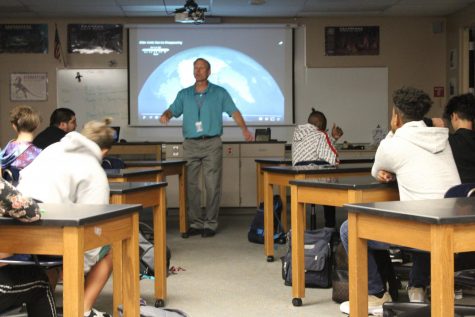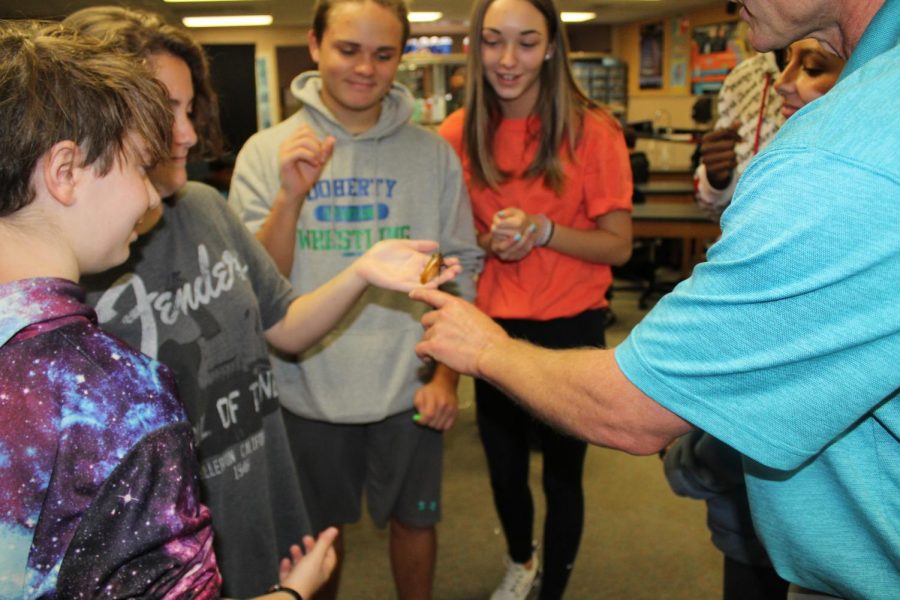New Curriculum Shift Underway for Doherty Students
Dr. Hebrink discusses with students about a cockroach in his Pre-AP Biology class.
September 24, 2019
If you’re an upperclassman, you know the anxiety as you sit down to take your first high-stakes exam, but what if you could walk into your AP, SAT, or ACT feeling prepared like it was just another vocab test? That and many more future-oriented skills are exactly what Doherty High School’s new learning framework system aims to achieve for every student coming into the 2019-2020 school year, and if all goes according to plan, for every year following.
Pre-AP classes are new to freshmen this year, including English 1,2, Algebra 1,2, Biology, and World History in both honors and regular variations. Mrs. Keller, our Gifted and Talented Coordinator, describes Pre-AP saying, “The Pre-AP courses offer a set of, as College Board calls them, frameworks, which are suggestions for timeline, pacing, some suggested lessons, those types of things for teachers to use. But teachers still have the ability to pull lessons that they know work and are tried and true.”
Pre-AP is centered around four core principles: evidence-based writing, higher-order questioning, academic conversations, and close observation and analysis. These shared concepts can be seen on posters in almost every classroom at Doherty. Mrs. Keller says, “All core areas are using the same verbiage, the same language… so I think hopefully that’ll help students because they won’t have to learn a different set of language as they go from course to course. The whole emphasis for Pre-AP is, we’re hoping that we can give 9th graders, and eventually 10th graders, foundational skills so that they feel like when they get into the upper levels of high school, they’re prepared to take on any coursework that’s more challenging.”
The new approach to teaching is meant to prepare students for all future pathways, not just those of college-bound students. Principal Darin Smith of Coronado, the other D11 school taking on Pre-AP this year, says, “We want to give everybody a solid foundation in fundamentals and in thinking and help our students think at a higher level. [When] you’re thinking about your junior and senior years and you may want to go do something totally different, you may want to do something that’s not necessarily college readiness; it’s career readiness, and we want to support that fully.” The four core concepts of Pre-AP can be found in multiple career and life pathways.
 “Even if you choose to go to a trade school, you’re still going to be asked to speak intelligently about topics, so that [involves] the academic conversation piece, you’re going to be asked to do some problem solving, which is the higher-order questioning piece, you’re probably going to have to do some writing [like] technical writing, so there’s your evidence-based writing piece,” said Mrs. Keller. Even the students in JROTC headed for the military will find Pre-AP teaches fundamental and concise writing skills they’ll need.
“Even if you choose to go to a trade school, you’re still going to be asked to speak intelligently about topics, so that [involves] the academic conversation piece, you’re going to be asked to do some problem solving, which is the higher-order questioning piece, you’re probably going to have to do some writing [like] technical writing, so there’s your evidence-based writing piece,” said Mrs. Keller. Even the students in JROTC headed for the military will find Pre-AP teaches fundamental and concise writing skills they’ll need.
Another goal of Pre-AP is to raise student expectations as well as minority involvement and achievement in higher-level classes. Statistically, on standardized and high-stakes college tests, there’s generally a gap in performance based on different demographics, including categories like race, gender, and students on free and reduced lunch. “Minority students tend to—and this is a broad generalization— not perform as well as Caucasian students. So what we’re trying to do is close that gap. Our hope is with the Pre-AP and exposing students to questions and subject matter in the 9th grade level, that’s more higher level, more rigorous, then that’s going to prepare them when they do take the big high-stakes tests like the SAT [to see] more improved scores on their end,” says Mrs. Keller.
By giving all students an equally challenging and expansive foundation, we should see an increase in test scores across the board. Subsequently, this should also raise enrollment in AP classes, as all students will feel more comfortable with higher expectations. Doherty Principal Kevin Gardner elaborates on this idea, saying “When kids feel confident in the skills they have and they are used to rigor throughout their high school experience, they should naturally feel comfortable taking more rigorous classes like AP so we would expect those numbers to grow.”
To gauge whether or not Pre-AP has proven successful, students will be taking 8 performance quizzes throughout the year. These results will indicate areas of adjustment for teachers to modify and fine-tune lessons. All freshmen will also take the PSAT 8/9 in October, as well as in the typical April session. Mr. Gardner said, “What we hope to see is an improvement on those measures. Those measures are what the state of Colorado uses to determine college and workforce readiness for all graduates in the state of Colorado. All of this information will help us to determine the effectiveness of Pre-AP for our students.”
Teachers at Doherty are hopeful Pre-AP will live up to its many ambitions. “I was one of the teachers that said ‘Yes, let’s do it.’ It does a better job, I think, of teaching kids to think. And if you get anything out of high school, the best thing you can do is learn how to think. You can solve almost anything on your own if you know how to take information, where to get it, and how to put it together and think about it.” said Doctor Hebrink, an Anatomy and Pre-AP Biology teacher at Doherty.
This past summer, 28 Doherty teachers and administrators attended a training conference in Las Vegas in preparation for Pre-AP. The training surrounded the Theory of Action, fundamental principles, and teaching frameworks. Mr. Gardner said, “ The professional development is one of the most important components of the successful implementation of this program. It’s a huge shift in instructional approach, and without the training, teachers wouldn’t be successful.”
Pre-AP has been received with mixed reviews from Doherty students. Sophomore Sierra Martinez, taking Pre-AP Biology, says, “I like that the class style is more interactive with all of the students alike. It pushes more kids to work together, even if they don’t know them. It’s a great collaboration key.” However, not all students have been happy with the changes. “I think everyone is looking for more structure… The teacher left us to ourselves to figure it out, she said that no one is wrong and that it’s guessing so it’s easy. But it’s super hard because all we want to do is work with what we know, and we didn’t know anything,” says Jennifer Bopp, another student taking Pre-AP classes this year. This reaction was anticipated, as well as intentional. Pre-AP classes are meant to challenge and push students to a deeper level of independent thinking.
When asking Mr. Gardner about the concerns raised by students, he said, “ Learning is an active endeavor and not a passive one. Pre-AP requires students to think critically to observe and analyze and engage in academic conversations. It requires student engagement, and that students do most of the work and most of the talking and not a teacher simply sharing information and asking students to memorize and repeat.”
Doctor Hebrink’s advice to students is as follows: “Don’t be afraid to try. Tell me what you think about it, and don’t be afraid to fail, or to be wrong…Kids want a good grade, and I want them to learn. You have to reward trying and failing, and struggling to learn. Life isn’t going to be perfect, [and] you’re going to screw up a lot. So I like that we’re teaching you some of those lessons too, and getting you confident enough to get out there and not always be right.”

Dr. Hebrink’s class Discussion in Pre-AP Biology.
Next year Pre-AP will be implemented in sophomore core classes, following this year’s freshman through their high school career.





